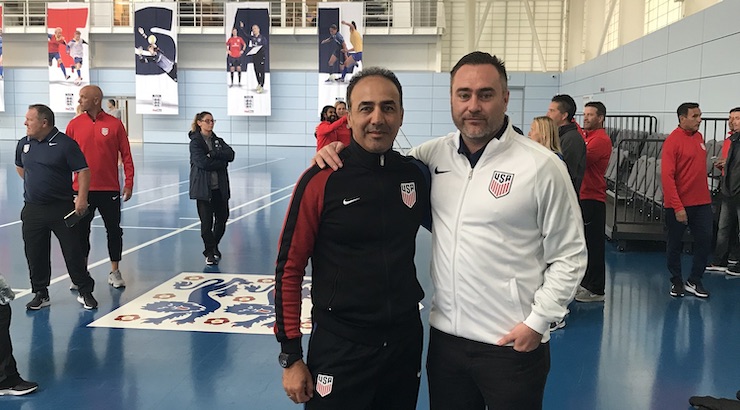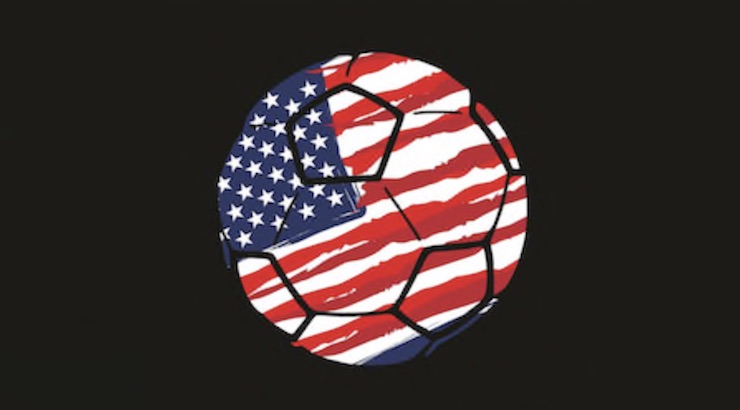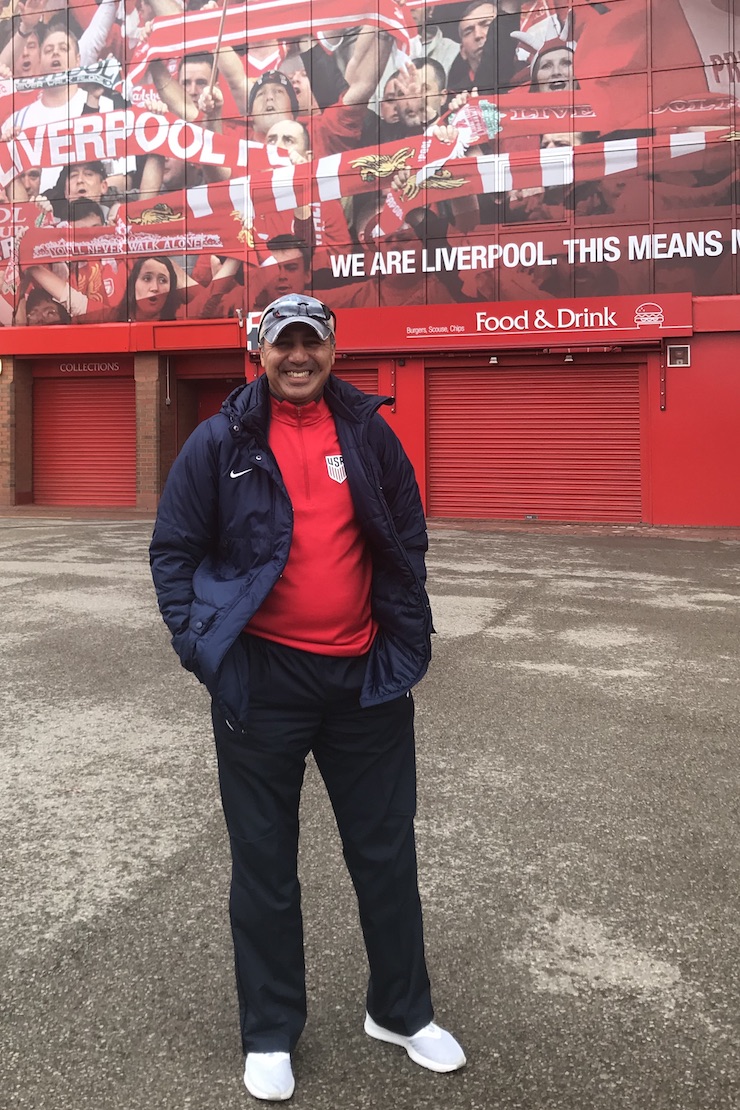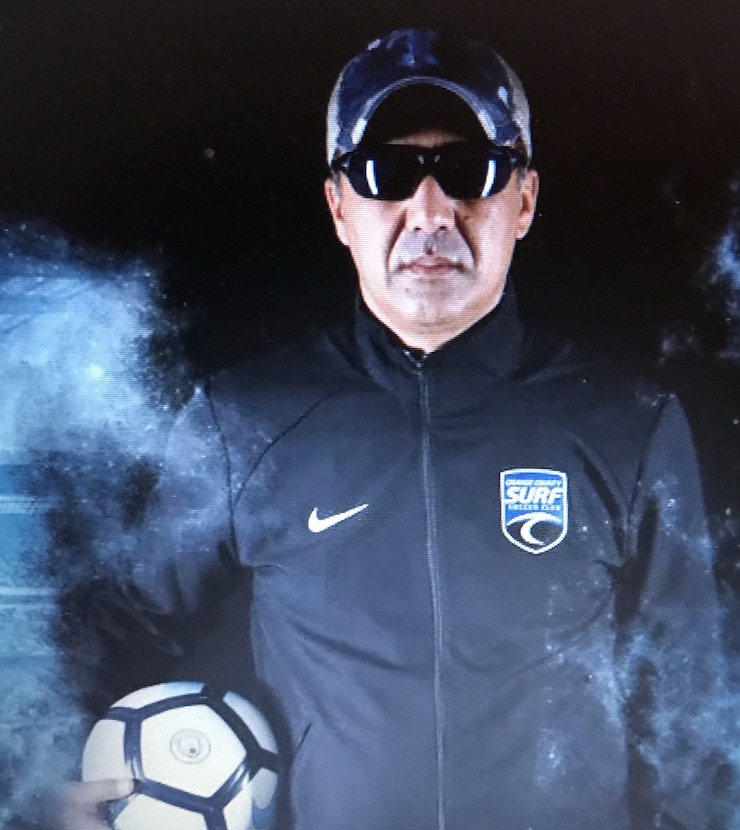What Can A Top Coach Learn on the U.S. Soccer’s Director Course in England? To Remember that our Youngest Youth Players are Kids, Not Professionals.
Platini Soaf has just returned from the U.S. Soccer Academy Directors Course in England and wanted to share his experience with our readers. Platini was recognized by United Soccer Coaches’ Coach Of the Year award, earning the 2017 Girls Far West Region Youth Coach of the Year and is a long time champion of the beautiful game.
Platini Soaf is a leader among his peers, recognized for as a coach dedicated to developing talent in his players. The Girls Development Academy Director at Orange County Surf SC, perhaps the most well-known player he coached is Rachel Buehler Van Hollebeke, Women’s World Cup winner and Olympic Gold medalist.
Buehler was coached by Platini when she played at Surf SC as a youth and has spoken his praises at every opportunity, often thanking him for his efforts publicly. Platini has also trained other top players including Amy Rodriguez.
Regardless of who he is coaching, Platini asks for and brings the best out of his players by using the game as the number one teacher.
SoccerToday’s Interview with Platini Soaf
Diane Scavuzzo: You recently returned from London, England on a trip with U.S. Soccer Development Academy Directors’ course — what was it like?
Platini Soaf: It was an eye-opener. U.S. Soccer handpicked the high-level coaches who traveled to England — It was less than twenty of us on the trip. We met with the FA, and with Manchester City and Birmingham. I told the U.S. Soccer Federation that it was the best education I have ever received.
And, now, it makes total sense why, we as a country, have never done the right thing for our children.
Diane Scavuzzo: What do you mean?
Platini Soaf: In the USA, there is a focus on the status quo — in youth soccer, this means winning.
Youth soccer has always been about the result. It was about just finding the best players. Recruiting. Not developing the players. For years, the emphasis has not been on making players better.
Our focus has not been on learning from our past and determining what we need to do moving forward —
And, then having the strength to be patient for five to ten years.

Diane Scavuzzo: I don’t think people realize that patience is so important — The machinery of youth soccer focuses on winning and bragging rights … using victories as a tool for recruiting. If a coach loses too many games, he can lose his players as well.
How do you think coaches could handle this better?
Platini Soaf: Youth soccer coaches should not have these pressures.
So how can we protect the coaches from the environment we have created — which is, if you don’t win, you’re not good? That is the question.
Diane Scavuzzo: What do you recommend?
Platini Soaf: It must come from the top — the environment is created by the leadership. So, what is the leadership want to do at the moment? I think the Federation has come to a point that, we as a country, have to take a different shift, and worry about the children’s development, instead of about just the results.
The Federation’s focus is on development which will lead to a winning nation.
America is not just a country — we are as large as a continent. Therefore, the leadership is not only at the Federation level, but at the end of the day, it must also include the state associations as well as the leagues and the clubs. They are closer to the players.
Everyone has to buy into making the player better and then the teams will be better. Otherwise, we are cheating the game.

All the leaders involved have to place player development as the first priority over winning. For example, by playing out of the back, you are making everyone stronger. By playing long ball, sooner or later your forwards will score goals but you are not developing your midfielders or defenders because you leaving them out of the action.
The Dutch style of player has everyone involved.
Diane Scavuzzo: What did you learn in England?
Platini Soaf: Players in Europe are advancing because, from the age of eight to twelve years old, boys and girls play together.
In many countries in Europe, young player are looked at as children, not as girls or boys.
Honestly, after this trip, I hope to influence and create change.
I will share a question with you. “You’re a kid and you’re nine years old. And you’re told that you’re not good enough to be on the first team and your youth soccer club has three levels. How is this good for a kid’s psychological development?”
This is a horrible experience for our kids — flight levels should not be numbered for our youngest players.
Kids start saying, “Well I’m not good enough, then why am I playing?”
And, they stop playing youth soccer.
Can you imagine if we did this separation in schools? Imagine if had a different second-grade classroom for kids with level one intelligence, level two intelligence, and level three intelligence? Why are we doing this in youth sports?

Diane Scavuzzo: What about the argument that to develop, players need to play against better competition?
Platini Soaf: As young youth players, Marta and Messi played with kids of all levels.
You do not create better players by only focusing on the top, because then you’re keeping your numbers very low. This is a sport. We all need to help each other to make each other better and grow the game.
When you focus on everyone, the sport grows and all players become better. I want to see both genders supporting each other and creating better players.
For example, if a player is a late bloomer and is enjoying playing the game — but after being pushed down to the lowest team, he or she wants to quit soccer to look for another sport … we could have lost a diamond in the rough.
That player’s confidence level is destroyed.
We have to find a better way without making some kids feel less worthy.
Diane Scavuzzo: America has a unique set of cultural problems which stem from a desire to win, This seems to be in the American DNA. How do we somehow segregate youth soccer from this and protect our youngest players?
Platini Soaf: With coaching education and parents’ education.
Birmingham coaches told us, “We develop our players in multiple positions. We tell U11 players they have to play three positions. From ages 12 to 15 years old, we tell our players they have to play two positions. When they become a pro, then they can pick their one position.”
They’re creating more masters with the ball than we are. Every player can dribble and their players do not panic under pressure.
The players are not told “You have to pass” all the time. These coaches give the freedom to the player to make a decision. Why do we have one Landon Donovan? Because he was given the freedom to express himself.
We place so much pressure on our young kids to win. We are treating our kids as if they were professional at a young age.
Kids are not professionals.
We’ve been asking a kid to play like a professional — when he or she is not developed yet.

Diane Scavuzzo: So what needs to change so the focus can be how can to create better players?
Platini Soaf: Youth soccer players shouldn’t be in an environment of, “I’m scared to lose the ball.”
They shouldn’t be in an environment, “I’m scared to lose today.”
They shouldn’t be in an environment, “What if I make a bad decision? I will be subbed — why risk making a decision?”
Diane Scavuzzo: Exactly …
Platini Soaf: This is what we need to attack at the youngest ages. We are the ones that are stopping our nation from having better players.
We can do better.
READ: PLATINI SOAF ON AMERICAN YOUTH SOCCER – WHAT’S RIGHT & WHAT’S WRONG
For more information on coaching courses, visit the U.S. Soccer’s Digital Coaching Center (DCC)
Note: This interview was originally published 11.18





